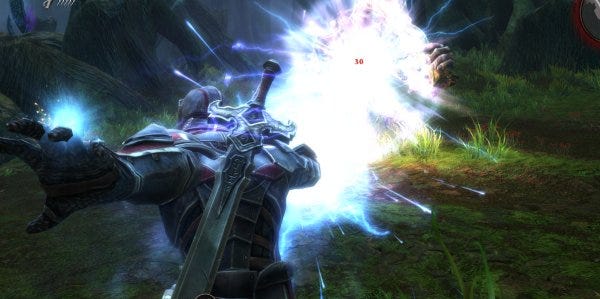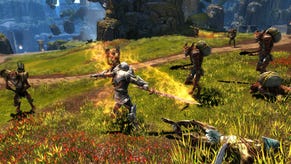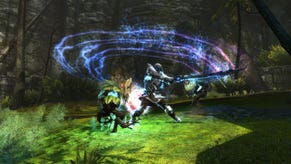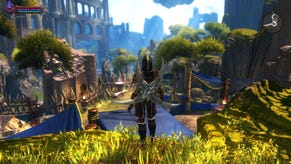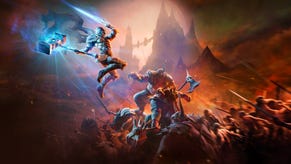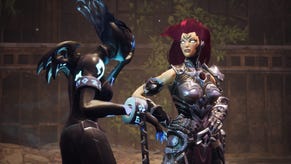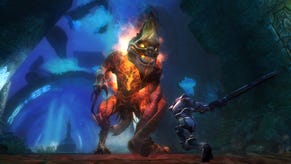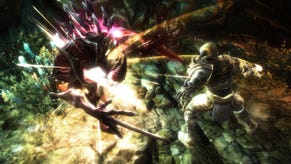Wot I Think: Kingdoms Of Amalur: Reckoning
Ham Of Legend
Having poured many fevered hours into the release version of Kingdoms Of Amalur: Reckoning I can now ask you not to judge it entirely on its weak, wonky demo. Have a read of my review, and then mix the two experiences together to create a potion of critical insight +3.
Here's wot I think.
There are familiar tensions at work in the heart of Kingdoms Of Amalur: Reckoning. These contrary directions the sort of thing that reveal the truth about what this game is trying to be. On the one hand it is a huge, (relatively) open world, with conversation trees and side quests spilling all over you like the eye-guts from a ruptured beholder - but on the other it is a constant free-fall in one direction: to the end of the plot. It is a saccharine kitsch pastel fantasy world of faeries and sunbeams, but also M-M-MONSTER KILL power up evisceration of a ferocity that would make God Of War suck air in through its teeth. Kingdoms Of Amalur wants to be everything.

Like a quest-dispensing NPC standing by the side of Amalur's many roads, I am going to have to engage in an explanatory preamble that attempts to provide some context for the existence of this game. In some ways it's an unusual event: a new RPG world that is going for the full platter of features, and on the other it's exactly the sort of RPG project you'd expect from a large publisher like Electronic Arts. In truth the Kingdoms of Amalur project is the progeny of a sort action-RPG super-group, with a millionaire backer, and a gang of game development stars from fantasy projects across various media.
The developer at the heart of the venture, 38 Studios, is the personal project of famed (and conveniently wealthy) baseball player Curt Schilling, who has long had a soft-spot for the Everquests, World of Warcraft, Warhammer Online, and even Shadowbane. It's hard to say quite how much influence he has had over Reckoning itself, but the MMO fraternity's influence is certainly strong on Amalur's world, systems, and overall execution. There's a family likeness here that it's impossible not to notice.

Also at the vanguard of this expedition into the well-known are Ken Rolston, a high-level game designer gentleman who worked on Morrowind and Oblivion; RA Salvatore, who writes endless novelisations of all kinds of fantasy and sci-fi worlds; and the dude who invented Spawn... Todd McFarlane. That's the fellow.
Together they would make a world.
A world. Yes. Perhaps not the most interesting world a supergroup of such sparkling pedigree could have conjured. Amalur is likeable, no doubt about that. But much of its charm comes from the sheer weight of content and generalised prettiness that it is able to unload on you. The creature designs are often beautifully animated and lovely to see in action, while the palette of customsation is as broad as any I can think of. Nevertheless the game is a deliberate soup of the forests, valleys, glades, canyons, caves, villages, monsters, and more forests that have underscored the existence of the past decade of fantasy games of all kinds.

There's chunks of Fable in here mixed with Guild Wars, and that's been marinaded in elements of various console combat games. There's a tiny whiff of Darksiders and several Bioware games have been grated over the top. It's even being served in the same sort of bowls that Bethesda use. (They're so fashionable.) The key ingredient, however, and the one that overpowers the other flavours, is the industry-bestriding garlic of World Of Warcraft.
On all sorts of levels the feel of Amalur is of an MMO with all those pesky massively multiplayer annoyances carefully erased. “Why, that's just a fancy excuse for a Diablo-like game, Mr Rossignol,” you rightly correct, but the truth is that this feels like the Ouroboros worm of genre pollination: we've come full circle and taking online game models offline again. Influences are being recycled and game design is eating itself. The success of MMOs have fed directly into the decisions made about how to make this big, bold single-player RPG project. Its influence can be felt in everything from the way loot drops to the way the art is designed.

That's not to say that there's anything wrong with Amalur's approach to fantasy-RPG creation. Millions of people will find pleasure here. I can't fault the production gloss or the sheer amount of things that the developers have crammed into it. (Although the menu UI is a bit crude and clunky, really surprisingly so.) Some of the key elements of the action RPG are also ripe unto bursting: Amalur is overflowing with treasures.
The little sparkles that come off almost everything interactive in the world are signposts for an endless supply of greaves, pauldrons, longswords, potions, and ingredients to make all of those things. That alone will ensure the game mesmerises many, and I have to admit the hypnotic tendrils of the shiny-armour-treadmill locked me down pretty quickly. The crafting – which is extensive in several directions – allows you to gather and collect and then fashion items and potions in that sort of near-unlimited distraction-based way that the popular MMOs manage to do.
The constant flow of sidequests, too, make for a MMO-like cascade of possible actions. While you are being dragged relentlessly towards the end of the game as if it were a quicksand grave in a 1960s action movie, the possibilities for going off and stabbing people in secluded glades are extraordinarily diverse. Remain undistracted and I suspect you can power through to the finishing line fairly quickly, but – as with The Elder Scrolls games – that would be missing the point. This, like Bethesda's RPGs, is all about wandering off the path for a bit. You have to come back eventually, but while you're poking about in bushes you'll join a brotherhood of warriors, buy a house, and probably rescue some young lover from being turned inside out by ogres. Five hundred favours for strangers will take place before lunchtime, then it's back to the real business of being The Chosen One. Yes, sir. You know the drill. And it's time to level up.

Where the game does not feel like an MMO is in its combat, and in its huge amount of dialogue. The combat is fast, silly, and rewarding. I like it because it's videogamey and ludicrous, and a sort of antidote to some much else that I have played in the past few years. It takes much more from the modern hack 'n slash genre – I'm thinking of games like Darksiders and God Of War – it feels more like a beat 'em up of old than even the most action-led RPG of current times. You leap and roll about, performing a blaze of combos on your enemies, even charging up a sort of rage metre to perform outlandish and grisly slow-motion finishing moves on your enemies. This is occasionally highly incongruous, with your armoured warrior (assuming you are not a robed wizard) grabbing a malicious faerie from the air and stabbing it repeatedly in the neck with laser-knives, complete with fountains of blood as your eyes blaze with plot-consequential magicks. Gosh.
You've got quite a bit of variety at your disposal, too – you can equip two different weapons and an shield to use all that the same time (you can block in real-time) – and the character customisation is wide open for much of the game – that whole “destiny” system they've spent the past year baning on about.

Combat can be stealthy, ranged, bloodily melee-based, or heavy on mystical fire, with you generally opting for a combination somewhere in the middle of that healthy paunch of character development. It's all beautifully arranged and choreographed, and it's completely glizty videogame escapism. The Witcher 2 and Skyrim feel like grimy, gritty real-world horrors by comparison.
The conversation and dialogue, which is Bioware-y in its delivery and draws on both elements of Bioware and Bethesda's games in its execution, tries to deliver a small library of options for finding out more information, or for getting different responses from the people you are talking to. Conversation is tied to skills, and you can get better at persuasion and so on as you play. All this stuff is definitely important to Amalur, and as much as I've banged on about the combat and action elements of this game, I can't fault it for trying to rival its peers in terms of the sheer volume of voice-acted scenes and side-quests. What I couldn't really discern in it, however, was much measure of change in the world, aside from events which are purely pre-scripted and already set up to happen. You don't really seem to have much influence. After the mighty plot-ramifications of player actions in the likes of The Witcher 2, that makes they story here seem a little inanimate.

I think it's important, at this final-third-of-review stage in the proceedings, to point out that I've found Amalur surprisingly compelling. It's a sugary, guilty sort of compulsion, though, because Amalur's formula is one that has ultimately entangled the part of me that wants to see the next pleasing monster design, or the next level of magic powers. The delightful contrast of stabbing someone with razor-fast daggers versus clubbing them to death with a half-tonne battle-hammer is good too, but what it does not offer is anything with serious meat. No grand vision, no technical triumph, no opera.
Despite the open structure, it's not really providing much for the digital explorer or the mystery-hungry reader. There is no pretension to a true sandbox, let alone any kind of living world. From a purely aesthetic point of view, the series of enclosed valleys it is guiding me through display none of the majesty of Skyrim's frozen peaks, while the quests and over-arching script interest me a fraction as much as almost any other seriously conversation-heavy RPG I can think of. The overall visual fidelity often disappoints, too: after The Witcher 2's artfulness, the dead-eyed (but still enormously friendly and characterful) mannequins of Amalur do not impress my inner graphics-card purchaser.

Ultimately, Kingdoms Of Amalur is generous but uninspired. This is a game that has been carved out of the bedrock of action RPGs by a team of well-paid professionals. Their work is fine, even nuanced, but their vision is not one that will leave you feel enriched or changed by the experience it produced. You can sense of the results of committee conclusions in almost all areas of the game.
Perhaps the worst part is that the core conceit of the Amalur's plot – that you are the one person in this world you can truly decide his own fate and therefore change the fate of others – is an interesting idea (even an interesting meta-comment on RPGs generally) that is dropped into an abyss of trad fantasy wibbling. The immutable weight of that stuff soon smothers any clever intention that the story might have held. Kingdoms Of Amalur's story is dramatic and spectacular in places, but it scarcely matters. I have no real stake in what is going on, and I don't really care. I'm just happy that my character has a huge moustache and a giant hammer. He's going to smite the living shit out of that ettin over there. And that's probably enough.
Kingdoms Of Amalur: Reckoning is out now in the US, and out tomorrow in the EU.
